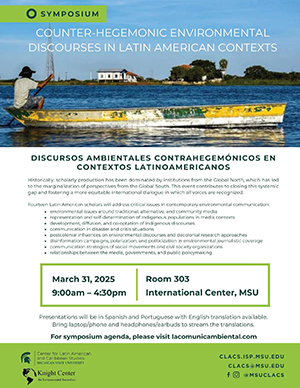 From Monday, March 31, to Wednesday, April 2, Michigan State University’s Center for Latin American and Caribbean Studies (CLACS) and the Knight Center for Environmental Journalism will host the Counter-Hegemonic Environmental Discourses in Latin American Contexts Symposium and Workshop. The event invites researchers, staff and students to join as 14 scholars representing eight Latin American countries discuss their research in environmental communication.
From Monday, March 31, to Wednesday, April 2, Michigan State University’s Center for Latin American and Caribbean Studies (CLACS) and the Knight Center for Environmental Journalism will host the Counter-Hegemonic Environmental Discourses in Latin American Contexts Symposium and Workshop. The event invites researchers, staff and students to join as 14 scholars representing eight Latin American countries discuss their research in environmental communication.
The symposium and workshop will allow scholars to share their perspectives from a critical and decolonial perspective, one rarely highlighted in western publications. The symposium aims to explore the obstacles researchers face in their fields, such as language barriers, hegemonic perspectives and paywalls.
Faculty, staff and students are invited to attend the full-day symposium where they will gain valuable insights from diverse, multicultural perspectives and have the opportunity to engage with international scholars. By fostering these connections, the MSU community can broaden its academic sourcing and open students to new, underrepresented ideas.
Among the featured presenters is Ana Claudia Nepote, a researcher and full-time professor based out of the city of Morelia in México. Nepote focuses on issues related to science-society interactions, environmental communication and communication for environmental sustainability. Her panel will be discussing cultural diversity in sustainability communication .
Another panelist, Reynaldo Morales, is an assistant professor and researcher at Northwestern University. His work in environmental communication is strongly influenced by his undergraduate experience in Peru during a time of political unrest. In addition to his research as an environmental communicator, he serves as an appointed member of the United Nations Indigenous Media Caucus.
The invited panelists will be presenting on several topics including intercultural perspectives, environmental justice, public opinion and more. The symposium will be held in the International Center on Michigan State University’s campus in room 303 from 9am – 4:30 pm. Presentations will be held in Spanish, Portuguese and English, with translation services provided.
Following the symposium, participants will be invited to the film screening of “The Fly Back: Restoring Territorial Rights in the Ucayali Basin,” directed by Morales. The documentary amplifies voices of Amazonian Indigenous peoples living in the Ucayali Basin and has received awards at the Cannes World Film Festival. The screening will take place in Well’s Hall, room B122 from 5pm to 6:30pm.
The two-day workshop, open to guest scholars, will be held on MSU’s campus following the symposium. During the workshop, scholars will collaborate in research proposals and the development of a Latin American environmental communication network. Organizer, researcher and MSU professor Bruno Takahashi Guevara organized the workshop to address hegemonic themes including how the transition to green economies in wealthier countries perpetuates the oppression of marginalized populations in low-income countries.
This symposium and workshop provide a valuable platform for exploring the unique challenges Latin American researchers face and to strengthen connections among scholars, researchers, and students. By fostering cross-cultural dialogue, the event and MSU aim to highlight a commitment to diverse perspectives and global engagement in addressing environmental challenges.
